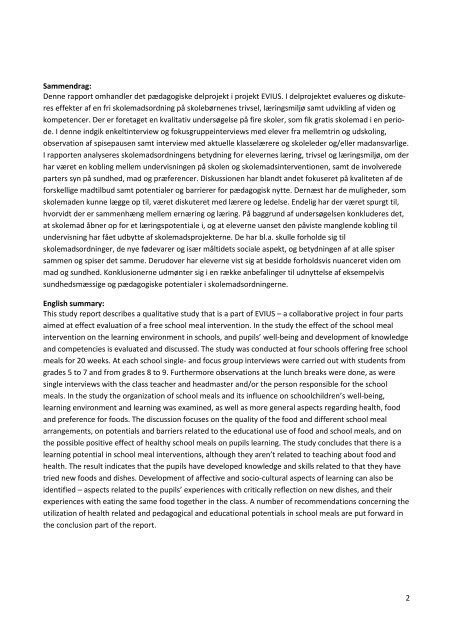giver skolemad næring for læring? - Projekt EVIUS - Aalborg ...
giver skolemad næring for læring? - Projekt EVIUS - Aalborg ...
giver skolemad næring for læring? - Projekt EVIUS - Aalborg ...
You also want an ePaper? Increase the reach of your titles
YUMPU automatically turns print PDFs into web optimized ePapers that Google loves.
Sammendrag:<br />
Denne rapport omhandler det pædagogiske delprojekt i projekt <strong>EVIUS</strong>. I delprojektet evalueres og diskuteres<br />
effekter af en fri <strong>skolemad</strong>sordning på skolebørnenes trivsel, <strong>læring</strong>smiljø samt udvikling af viden og<br />
kompetencer. Der er <strong>for</strong>etaget en kvalitativ undersøgelse på fire skoler, som fik gratis <strong>skolemad</strong> i en periode.<br />
I denne indgik enkeltinterview og fokusgruppeinterviews med elever fra mellemtrin og udskoling,<br />
observation af spisepausen samt interview med aktuelle klasselærere og skoleleder og/eller madansvarlige.<br />
I rapporten analyseres <strong>skolemad</strong>sordningens betydning <strong>for</strong> elevernes <strong>læring</strong>, trivsel og <strong>læring</strong>smiljø, om der<br />
har været en kobling mellem undervisningen på skolen og <strong>skolemad</strong>sinterventionen, samt de involverede<br />
parters syn på sundhed, mad og præferencer. Diskussionen har blandt andet fokuseret på kvaliteten af de<br />
<strong>for</strong>skellige madtilbud samt potentialer og barrierer <strong>for</strong> pædagogisk nytte. Dernæst har de muligheder, som<br />
<strong>skolemad</strong>en kunne lægge op til, været diskuteret med lærere og ledelse. Endelig har der været spurgt til,<br />
hvorvidt der er sammenhæng mellem er<strong>næring</strong> og <strong>læring</strong>. På baggrund af undersøgelsen konkluderes det,<br />
at <strong>skolemad</strong> åbner op <strong>for</strong> et <strong>læring</strong>spotentiale i, og at eleverne uanset den påviste manglende kobling til<br />
undervisning har fået udbytte af <strong>skolemad</strong>sprojekterne. De har bl.a. skulle <strong>for</strong>holde sig til<br />
<strong>skolemad</strong>sordninger, de nye fødevarer og især måltidets sociale aspekt, og betydningen af at alle spiser<br />
sammen og spiser det samme. Derudover har eleverne vist sig at besidde <strong>for</strong>holdsvis nuanceret viden om<br />
mad og sundhed. Konklusionerne udmønter sig i en række anbefalinger til udnyttelse af eksempelvis<br />
sundhedsmæssige og pædagogiske potentialer i <strong>skolemad</strong>sordningerne.<br />
English summary:<br />
This study report describes a qualitative study that is a part of <strong>EVIUS</strong> – a collaborative project in four parts<br />
aimed at effect evaluation of a free school meal intervention. In the study the effect of the school meal<br />
intervention on the learning environment in schools, and pupils’ well-being and development of knowledge<br />
and competencies is evaluated and discussed. The study was conducted at four schools offering free school<br />
meals <strong>for</strong> 20 weeks. At each school single- and focus group interviews were carried out with students from<br />
grades 5 to 7 and from grades 8 to 9. Furthermore observations at the lunch breaks were done, as were<br />
single interviews with the class teacher and headmaster and/or the person responsible <strong>for</strong> the school<br />
meals. In the study the organization of school meals and its influence on schoolchildren’s well-being,<br />
learning environment and learning was examined, as well as more general aspects regarding health, food<br />
and preference <strong>for</strong> foods. The discussion focuses on the quality of the food and different school meal<br />
arrangements, on potentials and barriers related to the educational use of food and school meals, and on<br />
the possible positive effect of healthy school meals on pupils learning. The study concludes that there is a<br />
learning potential in school meal interventions, although they aren’t related to teaching about food and<br />
health. The result indicates that the pupils have developed knowledge and skills related to that they have<br />
tried new foods and dishes. Development of affective and socio-cultural aspects of learning can also be<br />
identified – aspects related to the pupils’ experiences with critically reflection on new dishes, and their<br />
experiences with eating the same food together in the class. A number of recommendations concerning the<br />
utilization of health related and pedagogical and educational potentials in school meals are put <strong>for</strong>ward in<br />
the conclusion part of the report.<br />
2


